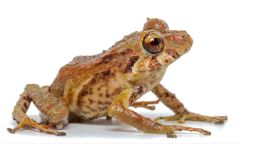Sign up for CNN’s Wonder Theory science newsletter. Explore the universe with news on fascinating discoveries, scientific advancements and more.
The tree of life grew in 2022 as California Academy of Sciences researchers and their international collaborators discovered 146 new animal, plant and fungi species.
The previously unknown creatures and plants were found around the world, including the mountains of California, Australia’s Queensland state, the rocky peaks of Brazil and the coral reefs of the Maldives. Scientists made discoveries on six continents and within three oceans.
Among the new species were 44 lizards, 30 ants, 14 flowering plants, 13 sea stars, seven fish, four sharks, three moths, two spiders and one toad.
Academy research associate Aaron Bauer’s work helped more than double the number of known species within a group of small forest geckos in the mountains of New Caledonia. The 28 new Bavayia geckos living across dozens of South Pacific islands bear similar brown and white markings.
“Nearly every mountain in New Caledonia hosts a unique Bavayia species, and these habitats share many of the same conditions,” Bauer said. “The result is several species that are often almost indistinguishable from one another.”
Meanwhile, San Francisco Bay Area high school students Harper Forbes and Prakrit Jain worked with Lauren Esposito, curator of arachnology at the California Academy of Sciences, to discover two new species of scorpions. The students saw images of the unidentified species on the iNaturalist online platform and conducted fieldwork to find the small scorpions, which live in the dry lake beds of Central and Southern California.
While one of the scorpions, Paruroctonus soda, is on federally protected land, the other, known as Paruroctonus conclusus, lives on a narrow, mile-long strip that’s unprotected.
“The entire species could be wiped out with the construction of a single solar farm, mine, or housing development,” Forbes said in a statement. “Mapping the biodiversity of a given area can help build the case for why that land should be protected.”
New species research is critical to identify ecosystems most in need of protection, said Shannon Bennett, California Academy of Sciences virologist and chief of science.
Indeed, conservation was one of the key topics at the 2022 UN Biodiversity Conference held December 7-19 in Montreal.
“As we’ve seen over the last two weeks at the United Nations Biodiversity Conference, biodiversity science is at the forefront of global conservation action and is key in unifying nations and equipping them with the tools and information necessary to reverse species extinction rates by 2030,” she said. “By uncovering and documenting new species, we can contribute to this landmark goal and ensure that our natural world remains rich and diverse for generations to come.”
Mountain finds
Academy research associate Julie Kierstead found a new species of onion by happenstance during a helicopter trip over California’s Klamath Mountains in 2015. When the copter landed on Minnesota Mountain for about 30 minutes, Kierstead spotted an unidentified flowering allium, part of a plant family that includes onions, shallots and garlic.
Since then, another patch of the Minnesota Mountain onion was discovered on nearby Salt Creek Mountain. Both peaks receive more rainfall than others in the region, which has allowed the onion to flourish.
Thousands of miles away, Frank Almeda, emeritus curator of botany at the California Academy of Sciences, and research associate Ricardo Pacifico identified new flowering plants on the isolated peaks of Brazil’s campo rupestre.
The harsh conditions of the mountainous region, which includes extreme temperatures, high winds and nutrient-leached soils, has caused plant life to adapt — and surprisingly thrive in such a barren environment.
Almeda and Pacifico found 13 new species of flowers as they surveyed parts of the ecosystem that botanists had never explored before.
“The shrubs on the summit were less than half a meter high,” Pacifico said. “It was like walking through a garden.”
The newly discovered flowering plants live under very specific conditions, and they could disappear due to environmental shifts driven by the climate crisis, the scientists said.
Beneath the waves
One of the seven new fish discovered this year was the rose-veiled fairy wrasse, which lives in the Indian Ocean’s “twilight zone.”
Known by the scientific name Cirrhilabrus finifenmaa, the colorful fish was found at depths ranging from 131 to 229 feet (40 to 70 meters) beneath the ocean’s surface off the Maldives.
“Twilight zone” reefs can be 160 to 500 feet (about 50 to 150 meters) beneath the ocean’s surface and provide a unique environment for fish such as fairy wrasses.

The name honors the fish’s stunning pink hues as well as the pink rose, the national flower of the Maldives. “Finifenmaa” means rose in the local Dhivehi language.
Hundreds of species thrive in the waters near and surrounding the archipelago nation, but the fairy wrasse is the first fish to be described by a Maldivian scientist — Ahmed Najeeb.
“It has always been foreign scientists who have described species found in the Maldives without much involvement from local scientists, even those that are endemic to the Maldives,” said Najeeb, a biologist at the Maldives Marine Research Institute, in a statement when the discovery was announced in March.
“This time it is different and getting to be part of something for the first time has been really exciting, especially having the opportunity to work alongside top ichthyologists on such an elegant and beautiful species.”




















